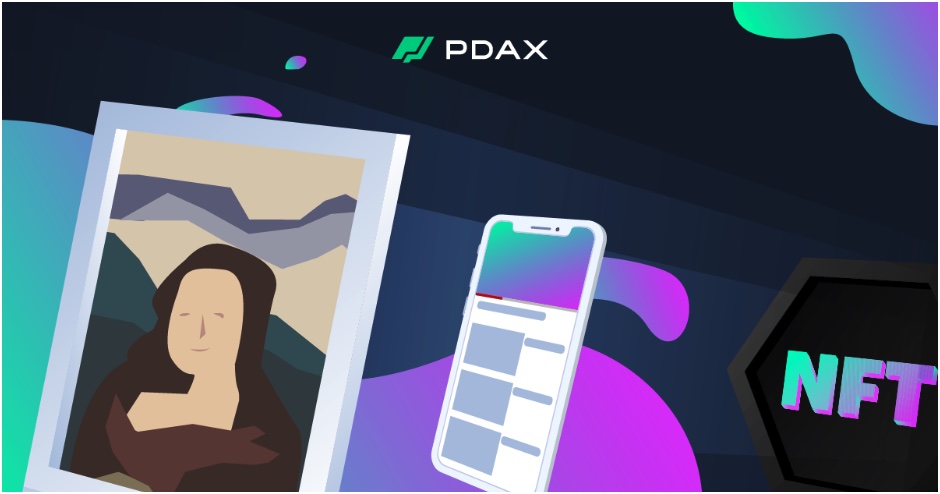How NFTs are creating an impact on Philippine art and entertainment
DISCLAIMER: The statements in this article do not constitute financial advice. PDAX does not guarantee the technical and financial integrity of the digital asset and its ecosystem. Any and all trading involving the digital asset is subject to the user’s risk and discretion and must be done after adequate and in-depth research and analysis.
NFTs, or non-fungible tokens, have experienced a meteoric rise in popularity in the past few months. Being non-fungible means tokens are all unique and can’t be replaced with anything else (unlike a bitcoin, which can be replaced by another unit of bitcoin), making it perfect for trading cards, rare collectibles, works of art, and more.

Artists like Beeple have even successfully sold an NFT of his work for a whopping US$69 million through auction house Christie’s. The meteoric rise of NFTs has resulted in a frenzy of celebrities worldwide like rap legend Snoop Dogg and tennis star Serena Williams promoting their own NFT collections, while a vibrant NFT gaming industry seems to have popped up overnight.
Naturally, NFTs have begun to make their impact felt in the Philippines. More Filipino artists are creating NFTs and many of our favorite teleserye stars are starting their own NFT collections.
Below is a look at how NFTs are making their impact felt among Filipinos.
Filipinos also love NFT art
As shown by digital artist Beeple’s NFT art collection commanding an impressive auction price, NFTs are a new way for today’s artists to make a living off of their art. Artists everywhere are selling off their tokenized pieces to a market of collectors eager to own a unique piece of art.
Filipino artists are no exception. Collectives like the Crypto Pop Art Guild have cropped up to help underprivileged Filipino artists take advantage of opportunities in the NFT market, with the result being that some members now earn $400 (P20,000) per month from NFT art.
The Narra Art Gallery has even introduced NFTs to famed events like Art Fair Philippines. The gallery is accessible via web browser, with five different “floors” showcasing NFTs made by Filipino artists. Not only is the gallery crucial for bringing opportunities in the metaverse closer to Filipino artists, but it’s also a new way to truly appreciate art.
NFTs made their way into Filipino entertainment
Even Filipino celebrities are getting in on the NFT boom. Actress-singer Nadine Lustre released 1,000 editions of her single “Wait For Me” as NFTs, with each on sale for $30.12 or roughly P1500. Actress/philanthropist Heart Evangelista also sold some of her paintings as NFTs on NFT marketplace OpenSea.
Recently, digital entrepreneur Julius Santillan even launched the Vention app, an NFT marketplace run by Filipinos. So far, the marketplace has been promoted by big names in Filipino entertainment like Gloc-9 and Ivana Alawi. The celebrity endorsements show an increasing awareness about NFTs, by some of the country’s biggest influences.
Of course, the Solana blockchain also hosts NFT marketplaces of its own. Platforms like Solsea, Solanart, and Magic Eden take advantage of Solana’s capability to handle large volumes of transactions and give artists and collectors a smooth, efficient experience when transacting. The presence of these platforms speaks to the demand for NFT art.
The above examples go on to show that underestimating the future of NFTs is a mistake. More than just being a novel, new type of digital asset, NFTs are showing that their unique properties (non-fungibility, backed by blockchain technology) have the potential to empower creators by giving them a better way to reach their audiences.
The development of things like the Solana blockchain and SOL will even help NFTs expand their reach and move towards mass adoption. With local crypto exchanges like PDAX offering the budding SOL coin on its platform and offering an easy way to cash out from NFT games, Filipinos will even have an uncomplicated and effortless way to cash in on the Solana blockchain’s potential growth. PDAX, for example, allows people to trade coins like SOL to Philippine pesos in just a matter of minutes, then cash out through a variety of online banking, e-wallet, and over-the-counter methods. With the PDAX app easily downloadable through the Apple App Store and Google Play, trading SOL is literally just a few clicks away. Thus, more than just celebrities and artists, both NFTs and SOL are more accessible than ever to ordinary Filipinos.
Both NFTs and adjacent developments like the Solana blockchain have already made their mark and are clearly here to stay. Anticipating the further impact they’ll make isn’t just exciting, but it’s also a must for anyone looking forward to the future.












No comments: